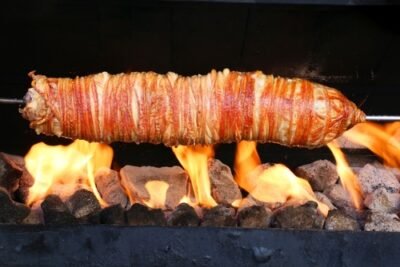Türkiye (Brussels Morning) In the late 1990s, two interesting stories unfolded in Turkey and Sweden. They show how countries deal with the clash between their traditional ways and public health rules and how the EU should have carefully considered cultural differences and future projections when making decisions.
In Turkey, the story revolves around ‘kokoreç,’ a popular street food made from lamb intestines, often enjoyed after a night out. When Turkey wanted to enter the EU, the EU forced Turkey to ban Kokoreç production in Turkey in 1999.

The reason for the ban on kokoreç is due to its potential risks and the need to maintain high hygiene standards in the production process. Turkish people got angry and disappointed.
We didn’t focus on how to make kokoreç safer and how to sustain a hygienic production process. Instead, we saw the ban as an insult to our culture. We made songs about kokoreç, talked about its importance in Turkish cuisine, and stood up for it. But at the same time, everyone knows that kokoreç can be risky to eat, and we only go to places we trust to get it.
In Sweden, the story is about ‘snus,’ a type of tobacco product and now a nicotine pouch, which holds significant importance for many Swedish people, especially those in jobs requiring the use of both hands simultaneously. ‘Snus’ has been part of their daily life for over 200 years. In the run-up to the 1994 referendum on EU membership, Sweden faced a unique dilemma.
The use of snus, deeply ingrained in their society, was illegal under EU regulations. This presented a significant cultural and social clash, leading to widespread apprehension among the Swedish population. The sentiment was clear: if the EU didn’t allow snus, it didn’t allow a fundamental aspect of Swedish identity. Some experts have even speculated that had the EU not granted an exemption for snus, the Swedish people might have rejected EU membership altogether.
The EU’s decision to ban kokoreç in Turkey was primarily driven by health and safety concerns, not by an intention to insult or eliminate a part of Turkish cuisine, and this decision was justified.

Therefore, this decision is consistent with the situation in Greece, where the same dish, kokoretsi, is enjoyed without such a ban (though it’s important to note that kokoretsi is uniquely Turkish, not Greek!) The experience with snus in Sweden served as a valuable lesson for the EU. It underscored the EU’s need to thoughtfully acknowledge and navigate cultural differences when formulating decisions.
However, the EU has invested considerable time and effort in avoiding learning from the Swedish case. Let’s go deeper into the Swedish case and examine the developments the EU seems reluctant to acknowledge.
What is Harm Reduction?
Fast forward two decades and the implications of the snus decision are evident. The allowance of snus, a product significantly less harmful than traditional smoking tobacco, has had profound public health implications. It has offered a less harmful alternative to smoking, aligning with harm reduction principles and potentially influencing broader trends in public health across Sweden and the EU.
Harm reduction is a pragmatic and human-centered approach in public health policy, originally conceptualized in the context of illicit drug use. It acknowledges the complexities of addictive behaviors and recognizes that while abstinence is the ideal goal, it’s not always a realistic or achievable one for everyone. The essence of harm reduction lies in minimizing the adverse health, social, and economic consequences of addictive behaviors, both for the individual and society at large, rather than focusing solely on eliminating the behavior itself.
When applied to tobacco, harm reduction takes on a critical role. Tobacco Harm Reduction (THR) is centered around reducing the morbidity and mortality associated with tobacco use, particularly among smokers.
The ultimate reduction in harm would come from the complete cessation of nicotine use. However, THR pragmatically recognizes that total abstinence is not always feasible. Instead, it advocates for the transition to less harmful forms of nicotine consumption as a primary goal.
The core of THR is understanding the “spectrum of harm” associated with various nicotine products. This spectrum ranges from conventional smoked tobacco, like cigarettes, which sit at the top as the most harmful, to medicinal nicotine (nicotine replacement therapy, or NRT) at the lower end, signifying the least harmful. The position of other nicotine products on this spectrum, particularly regarding their long-term health impacts, is more complex and subject to ongoing research.
The Case of Snus and E-cigarettes in Sweden
With its long history in Scandinavia, snus falls towards the lower end of this spectrum, indicating a relatively lower level of harm. This position is supported by the latest research on its effects over the past 10 years.
E-cigarettes, a more recent innovation, have also garnered considerable attention. While more long-term research is needed to address remaining concerns regarding their harm profile, including issues related to youth uptake and dual use alongside traditional tobacco products, there is strong evidence suggesting their potential to help smokers quit cigarettes and in combating tobacco-related cancers and other cardiovascular issues. Sweden’s experience with snus and its comparatively lower rates of tobacco-related health issues offer a compelling case study. Consider the following data:
Men’s lung cancer rates per 100,000 are 87 in Sweden, markedly lower than other EU countries, where these numbers range from 91 to 399.
For cardiovascular diseases, Sweden’s rate is 72 per 100,000 in men, significantly less than the 107 to 608 range seen in other EU countries.
The rate of all causes related to tobacco use in Sweden is 222 per 100,000, in stark contrast to the 378 to 1,399 range in other EU nations.
These statistics highlight the success of Sweden’s tobacco harm reduction efforts and underscore the potential of such strategies in broader public health contexts. The Swedish model, with its emphasis on lower-harm alternatives like snus and potentially e-cigarettes, offers valuable insights for other countries grappling with the public health challenges posed by tobacco use.




